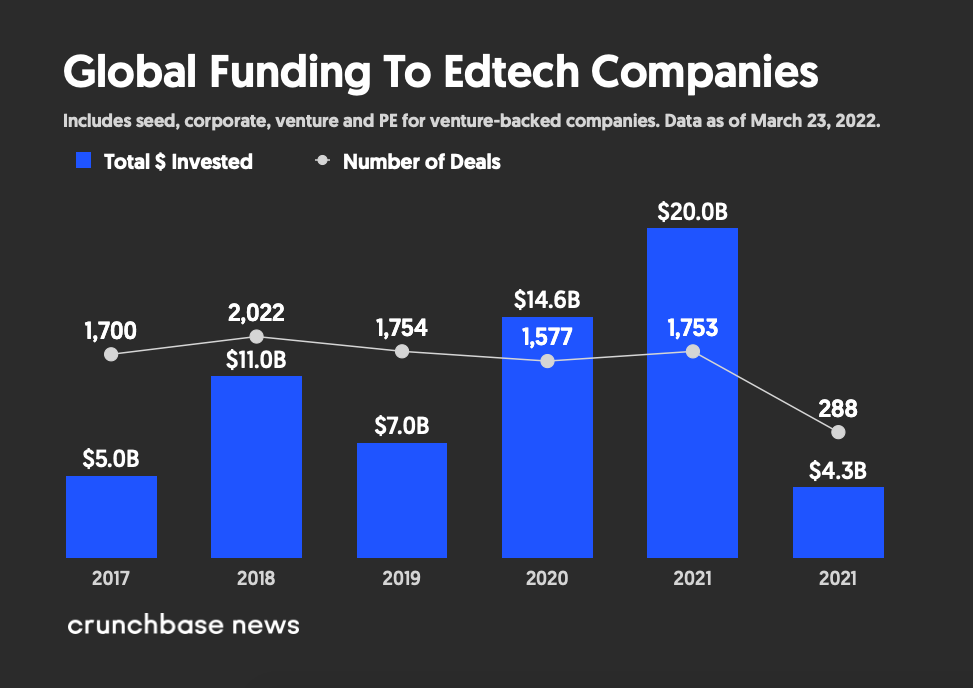Edtech has had a standout two years.
While many schools have returned to in-person instruction after virtual learning accelerated the adoption of education technologies, the sector still saw a spike in funding last year.
Search less. Close more.
Grow your revenue with all-in-one prospecting solutions powered by the leader in private-company data.
VC-backed companies in the education space raised more than $20 billion last year, up from around $14.6 billion in 2020, per Crunchbase data. The sector also saw a number of high-profile companies exit to the public markets, with companies including Coursera, Udemy and Duolingo doing initial public offerings.
Now, the space is primed for investment across the board, according to Amit Patel of education-focused investment firm Owl Ventures.
“We’re very much in the beginning stages of what’s going to be a significant opportunity across all of those areas,” Patel said.
The foundation for the edtech funding boom was laid years ago. With more investment in technology infrastructure for schools over the past decade, edtech companies can now scale, he said.
Some of those investments in infrastructure include government investment in connectivity and devices for schools, such as broadband internet, tablets and mobile connectivity. And more connected students with devices means more customers.
“You now have entrepreneurs coming into the sector because they see the fact that they can build and scale companies,” Patel said. “You have investors recognizing that well. And the success and proof points start to increase as well.”
Funding to edtech really exploded in 2020, when $14.6 billion was invested in VC-backed education companies globally. That’s up from $7 billion in 2019. And the momentum continued into 2021, with companies such as Articulate raising $1.5 billion for workplace training tech and BYJU’s raising $460 million for K-12 personalized learning programs.

Adult education offerings grow
Companies that received the most funding last year range from adult education and upskilling startups to exam software to learning programs for children. One subsector that appears to be growing is online education for adults, an area that includes Coursera and Udemy.
That’s something Coursera has noted as well, with CEO Jeff Maggioncalda saying in a recent earnings call with investors that skills development is a major emerging trend.
“Governments are looking to skill up their public sector employees, while also launching national and statewide development initiatives to build equitable workforces that drive sustainable economic growth,” Maggioncalda said. “Campuses are realizing that they must enhance the quality of their offering as competition from alternative credentials. And the substitution effect of a strong labor market requires them to deliver stronger employability outcomes more cost effectively.”
Patel expects investment to continue across the board. On the adult side, “the idea is that the economy is changing, the workforce is changing, and to remain competitive and relevant and whatnot we’re going to have to reskill and upskill.”
Other trends to watch
Other emerging themes are the direct-to-consumer model for education, particularly for working adults looking to upskill, mental health resources for both children and adults, and the international nature of edtech—such as a company being based in one country but serving educators in other parts of the world.
Of the 50 largest funding rounds to edtech companies last year, more than half went to companies based outside of the United States, according to Crunchbase.
“The interest in the category has never been higher,” Patel said. “The fact that we were close to $21 billion in investment this last year is once again indicative of the opportunity.”
Illustration: Dom Guzman

Stay up to date with recent funding rounds, acquisitions, and more with the Crunchbase Daily.



67.1K Followers